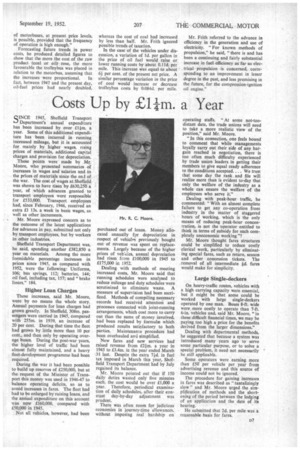Costs Up by El fm. a Year
Page 81

If you've noticed an error in this article please click here to report it so we can fix it.
SINCE 1945, Sheffield Transport Department's annual expenditure has been increased by over film. a year. Some of this additional expenditure has been incurred in running increased mileage, but it is accounted for mainly by higher wages, rising prices of materials, additional capital charges and provision for depreciation.
These points were made by Mr. Moore, who presented summaries Of increases in wages and salaries and in the prices of materials since the end of the war. The cost of wages at Sheffield was shown to have risen by £630,250 a year, of which advances granted to transport employees were responsible for £533,000. Transport employees had, since February, 1946, received an extra £1 13s. a week in basic wages, as well as other increments.
Mr. Moore expressed concern as to the outcome of the latest applications for advances in pay, submitted not only by transport employees, but by workers in other industries.
Sheffield Transport Department was, he said, spending another £382,850 a year on materials. Among the more formidable percentage increases in prices since 1945, as compared with 1952, were the following: Uniforms, 106; bus springs, 112.' batteries, 144; oil fuel, including tax, 157; and "brake liners," 184.
Higher Loan Charges
These increases, said Mr. Moore, were by no means the whole story. Annual payments for loan charges had grown greatly. In Sheffield, 308m. passengers were carried in 1945, compared with 255m. in 1939, an increase of 20 per cent. During that time the fleet had grown by little More than 10 per cent., and then only by operating overage buses. During the post-war years, the higher level of traffic had been almost fully maintained, and a heavy fleet-development programme had been required.
During the war it had been possible to build up reserves of £250,000, but at the request of the Minister of Transport this money was used in 1946-47 to balance operating deficits, so as to avoid increases in fares. The fleet had had to be enlarged by raising loans, and the annual expenditure on this account was now £160,000, compared with £50,000 in 1945.
Not all vehicles, however, had been purchased out of loans. Money allocated annually fur depreciation in respect of vehic.l.t.ri previously bought out of revenue -vas spent on replacements. Largely because of the higher prices of veh:131as, annual depreciation had risen from £100,000 in 1945 to £175,000 in 1952.
Dealing with methods of meeting increased costs, Mr. Moore said that running schedules were analysed to reduce mileage and duty schedules-were scrutinized to eliminate waste. A measure of supervision had been sacrificed. Methods of compiling necessary records had received attention and processes connected with joint-running arrangements, which cost more to carry out than the sums of money involved, had been replaced by formulre which produced results satiefactory to both parties. ' Maintenance procedure had been overhauled and simplified.
New fares and new services had raised revenue from f21rn. a year in 1945 to £3.4m. in the year ended March 31 last. Despite the extra 74d. in fuel tax imposed in March this year, Sheffield Transport Department had by July regained its balance.
Mr. Moore pointed out that if 150 daily duties wasted only five minutes each, the cost would be over £1,000 a year. Therefore, periodical examination of daily schedules, after their constant day-by-day adjustment was prudent.
There was often room for judicious economies in journey-time allowances, without imposing real hardship on operating staffs. "At some not-toodistant date, the trade unions will need to take a more realistic view of the position," said Mr. Moore.
"In this connection, one feels bound to comment that while managements loyally carry out their side of any bargain reached in negotiation, there is too often much difficulty experienced by trade union leaders in getting their members to give equal ready adherence to the conditions accepted.... We trust that some day the rank and file will realize more than is evident to-day that only the welfare of the industry as a whole can ensure the welfare of the employees who serve it."
Dealing with peak-hour traffic, he commented: "With an almost complete failure to get any co-operation from industry in the matter of staggered hours of working, which is the only means of reducing peak-hour concentration, is not the operator entitled to think in terms of subsidy for such completely uneconomic working "?
Mr. Moore thought fares structures could be simplified to reduce costly clerical work, particularly by eliminating special fares, such as return, season and other concession tickets. The .removal of all intermediate id. fares would make for simplicity.
Large Single-deckers
On heavy-traffic routes, vehicles with a high carrying capacity were essential, but it might be that some could be worked with large single-deckers operated by one man. Buses 8-ft wide were more costly to operate than 7-ft. 6-in, vehicles and, said Mr. Moore, "in these difficult financial times, we may be paying too high a price for the benefits derived from the larger dimensions."
Dealing with departmental methods, he suggested that because a system was introduced many years ago to serve some particular purpose, or to solve a special problem, it need not necessarily be still applicable.
Some operators were earning more than £50. per vehicle per year from advertising revenue and this source of income could not be ignored.
The procedure for gaining increases in fares was described as "tantalizingly slow" and Mr. Moore urged the simplification of methods and the shortening of the period between the lodging of an application and the date of its hearing.
He submitted that 2d. per mile was reasonable basis for fares.




































































































































































